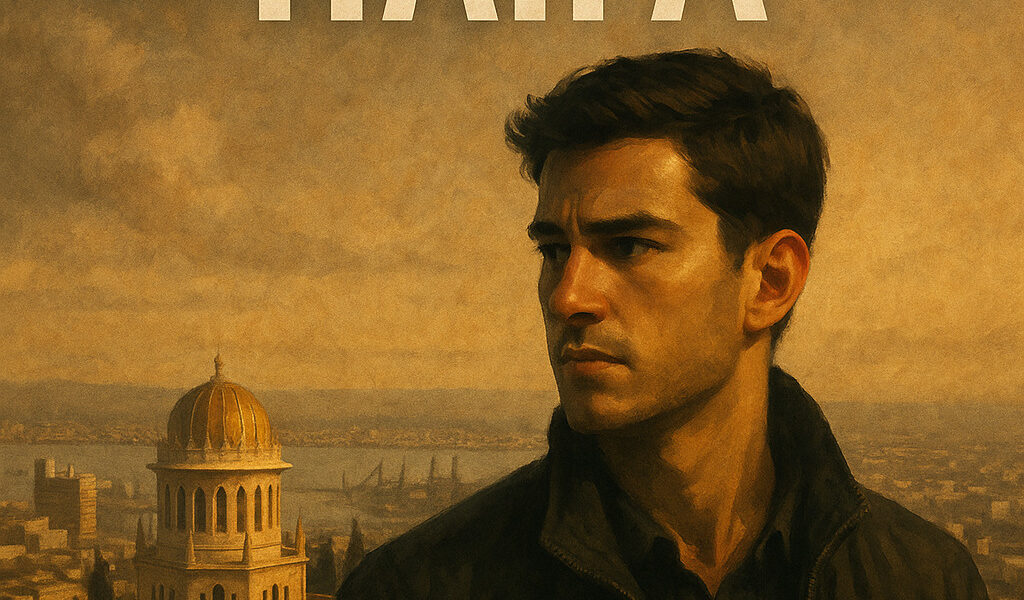Haifa shimmered in the morning haze.
The city was built like a confession, sprawled up the curve of Mount Carmel, its streets folding into themselves, revealing hidden staircases, rusted gates, and secrets in full daylight. Below, the Mediterranean moved slowly, a body too large to lie but too old to tell the truth.
Alon stood at a street corner shaded by jacaranda trees, the purple blossoms just starting to fall. They dusted the pavement like ash from a fire that hadn’t yet started.
He held the photo Nora left him in one hand, creased now, edges soft from worry.
A boy.
Sand-colored house.
Mount Carmel.
Not much to go on. Unless you knew what to look for.
He had known. The window position. The shape of the doorframe. The spacing between steps. Military training teaches you how to read architecture the way others read faces.
It had taken him six hours to find the building.
Another one to confirm the boy had grown up in a state orphanage five miles inland. No listed foster home. No family.
But the records had stopped when the boy turned fourteen.
No one forgets a child like that. Not unless someone tells them to.
The house still stood.
A little more weathered. A fresh coat of paint couldn’t hide the cracks. Curtains drawn. A potted plant with too little sunlight on the windowsill.
Alon knocked once.
Then again.
No answer.
He waited. Counted ten slow seconds.
Then the door opened, just a crack.
The boy wasn’t a boy anymore.
Late twenties. Thin. Still. The kind of stillness that didn’t come from peace, but from habit. Like an animal taught not to breathe too loud.
His eyes, those same eyes, narrowed.
“You’re not here by accident,” the man said.
“No.”
“You were in the compound.”
Alon didn’t reply.
The man stepped aside.
“Then you’d better come in.”
Inside, the air smelled like dust and oranges.
The place was simple. Unfurnished, except for a small kitchen table, two chairs, and a battered computer in the corner. Books lined the floor, spine-up, unorganized. One page on the wall, torn from a newspaper, pinned with a rusted nail.
It was a name.
Nora Ben-Meir.
Below it: a headline from a defense journal article about AI and memory systems in intelligence infrastructure.
Alon didn’t sit.
“She sent me,” he said.
The man looked at him. “She said you would come.”
“You’ve spoken?”
“No. But she came through once. Three years ago. Didn’t say much. Left me something.”
He reached under the table. Pulled out a metal box. Opened it slowly.
Inside: a flash drive and a child’s drawing.
A face.
Red ink for eyes.
Alon reached for it.
The man stopped him.
“She said only to give it to you if you remembered what you forgot.”
Alon looked at the man.
Then spoke, low and slow.
“Your name was Avi’el. You used to trace lines in the dust with your finger. The shape of the compound. The guards’ boots. You never spoke a word until we extracted you. And the last thing you did was stare at the fire and whisper, ‘It’s not finished.’”
The man nodded.
Then handed him the drive.
That night, back in his rented flat overlooking the port, Alon plugged the drive into an isolated terminal.
It didn’t ask for a password.
It played a video file.
Nora appeared on screen. No sound at first. Just her sitting in a bare room, lit from one side, like an interrogation that had turned into a confession.
Then her voice.
“They’re writing people, Alon. Not reports. Not files. People. Reassigning memories like code. Overwriting loyalties. Hiding entire histories inside artificial ghosts.”
“And the worst part?”
She looked straight into the lens.
“They used me to test it.”
A pause.
“And I let them.”
The screen went black.
Then a final line appeared.
“This is how they erase you: not with bullets, but with belief.”
Alon leaned back in his chair.
Outside, the sea was black glass.
And somewhere, beneath the surface, something old and dangerous had just remembered its name.

